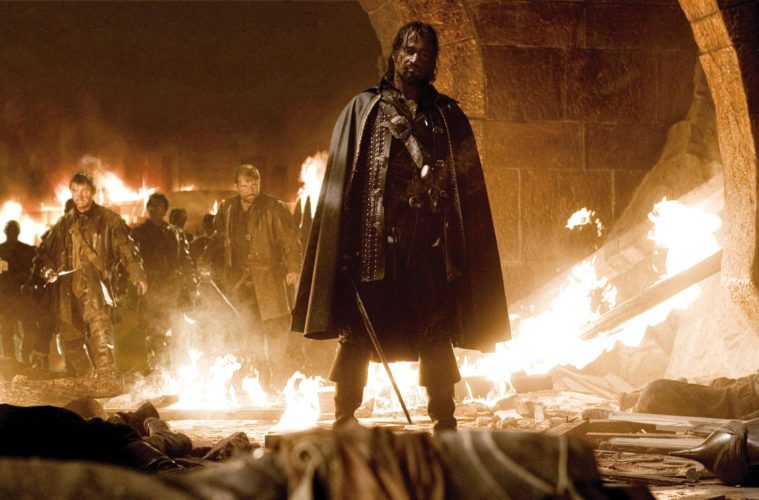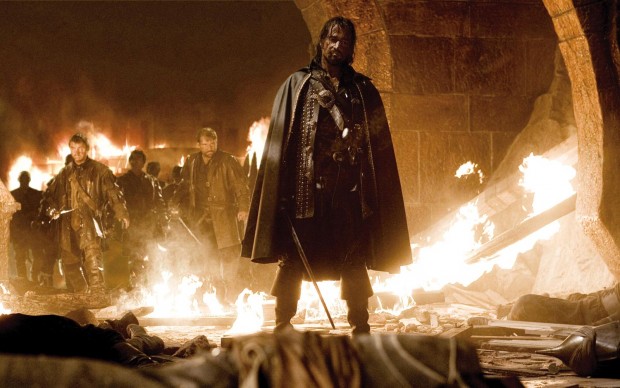
Sometimes an interview can nearly steer itself. You come in with some questions prepared, then it takes off on a path that is much more interesting. Last week, as I was talking with writer/director Michael J. Bassett about the upcoming release of his film, Solomon Kane, he seemed more interested in talking about the industry as a whole and he gave some interesting points and ideas about how some genre films, no matter how good, end up being dragged down by whether they can be marketed successfully or not. The film sat on a shelf after an initial theatrical release overseas in 2009 and is finally hitting North America right now.
If it wasn’t obvious, that’s a long time between releases. Bassett talked about the genesis of the project and how he came up with an origin story for Kane, whether that long-delayed release hurt his own projects, why he’s stunned Dredd hasn’t made more money, his disappointment with Prometheus as a fan, and digesting reviews and opinions and admitting to his own failures within a film, and much more. If you have ever wanted a filmmaker to simply come out and speak honestly, this is the interview for you.
The Film Stage: This film’s genesis has been kind of incredible. It’s been an internet myth for U.S. audiences that the film actually exists, and then I finally saw it earlier this week so I can confirm to everybody that it does in fact exists and it’s an interesting trip. But I’m not sure how much you were involved in the genesis of this project and how far it came from script to screen. Was this something that when you got your hands on you were surprised it hadn’t been made yet?
Michael J. Bassett: Well the history of Solomon Kane obviously goes back an awfully long way. It was one of Robert E. Howard‘s first writings. He created the character when I think he was 15 or 17 years old. It was one of the first things he came up with. So the trajectory of it being a long, long time coming, almost a hundred years now. And the thing of it is that either you like fantasy, which I do: I’m a fantasy fan. I read fantasy as a teenager. I adore fantasy now. I love the genre. There are a handful of characters that you think, ‘That’s got to be a movie.’ And I grew up hearing Conan and those kinds of things, and you think, ‘Well, Kane should exist. I want to see him.’ So when I became a filmmaker, I mostly made lowish-budget horror movies, but fantasy was the great love of my life. I always wanted to make a fantasy picture. And make it seriously. Not the slightly tongue-in-cheek, we know it’s all a bit silly, wink at the audience kind of movie. I wanted to make something where the world mattered to the characters in there. What was at stake was serious. That’s Solomon Kane through and through. Even though he trained in witchcraft and sorcery and magic, this is a world fate is real. A god, whoever his god is, he is real. And the metaphysical and all that.
So it was a huge thing for me when I heard they were going to do it. I met with the producers who had bought the rights to the character I think 15 years ago or a long time ago. They had been trying to make it because they were fans as well. They’d loved the writing. To many people Solomon Kane the movie is a comic book movie, but it’s not. It’s a literary adaptation because Kane is a literary character before he was ever in comics. So I had met with these guys and they said, ‘Do you know Solomon Kane?’ and I said, ‘Of course I know Solomon Kane.’ I really, really wanted the job coming off these lowish-budget horror movies. I had some good material to show them. It wasn’t a natural progression. It’s like Peter Jackson doing Brain Dead. It’s not a natural progression to Lord of the Rings. So I pitched them for what I wanted to do with the character and they wanted an origin story. Which I was kind of cool with because Kane on the page just exists. There’s no sense of where he’s come from until you start really reading between the lines.
And I thought, ‘OK, I’ll give him an origin story and by the end of this tale we’ll have end where he is on the page.’ And that’s what I tried to do. To create a mythology for him. A trajectory for the character and creating a fun fantasy adventure at the same time. So I pitched this. I wrote a little bit of the script out to show them what I’d do with it, and I went to meet the French producer called Samuel Hadida who produced Brotherhood of the Wolf, Silent Hill, and the Resident Evil movies. I had to persuade him I was the guy to write it. Then I had to persuade them I was the guy to direct it. They were very supportive. I put together some storyboards and key artwork and said, ‘This is the movie I want to make. It’s a dark, serious-minded picture.’ I wanted it to be entertaining, but it’s not going to be fun. It has to reflect who Solomon Kane is. To their credit they gave me a really decent little budget for an independent picture. I got to cast James Purefoy, who I was a big fan of anyways. I think he’s magnificent in the lead role. And surround him with some terrific supporting actors. Max von Sydow, the late, great Pete Postlethwaite, Alice Krige, Rachel Hurd-Wood. They’re a good supporting cast and we put them in a world which literally is grim, tense, and hopefully compelling in its own, dark way.
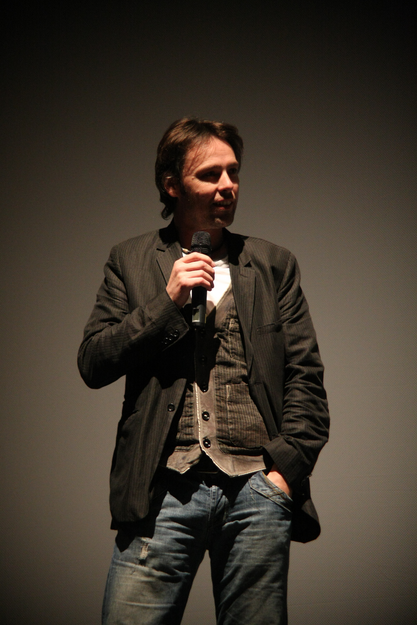 It’s funny that you’re saying you created an origin story basically for this character that had existed for a while. But I’m curious, taking from the Robert E. Howard books, was there any imagery that you were thinking of including in the film that ultimately didn’t make it in because of budget or just time?
It’s funny that you’re saying you created an origin story basically for this character that had existed for a while. But I’m curious, taking from the Robert E. Howard books, was there any imagery that you were thinking of including in the film that ultimately didn’t make it in because of budget or just time?
Imagery from Howard’s work itself, you mean?
Yeah.
Uh, no. To me, it was a tonal thing and character thing rather than specific imagery. I got the notion that Kane had historically been a bad man who was somehow fleeing his demons. There’s a line in one of the stories, I think it’s The Blue Flame of Vengeance, and he references this town that these men attacked when he was a privateer, and he says how much he regretted it. That was a really key line for me to say, ‘OK, this is a possibility.’ Howard later contradicts himself in the stories, but I decided that was the one that I liked. That gave me the opportunity to begin the trajectory of his journey. I was sort of saving my path because if the movie is popular, which it has been in the rest of the world, as potentially a movie sequel or TV series, because Howard’s stories lend themselves very naturally to that. Kane is such an unbending character in the books that he’s kind of tricky to give a full arc to him. One of those things you want to do to a movie character is to have a journey you can go on with the central character. So it was always a challenge to consider what to do until we decided to step outside Howard’s original prose story structure. And I’m taking serious liberties and I know that there are furious Howard fans out there who intensely dislike the choices that I’ve made to do that.
And I completely respect it. But it was done with a love of the character and an attempt to say, ‘Listen, we get more with him if we can open it up to a wider audience who don’t know Kane.’ Because Kane is still a relatively obscure character in the pantheon of fantasy fiction. So it was done with every attempt to try to make it work. Of course you put him in his hat and his cape. You give him his sword and his sash. I changed the color of the sash from green to red because it looked a little bit better with the black costume. Little things like that, which people call me out on, but it was generally a little bit of everything. It sort of worked and I think most of the Howard fans seem to like it. And then, of course, I have to continue to transcend that audience because it’s quite small, and hopefully find a wider audience. Fans who don’t normally get fantasy movies which are quite this serious. Maybe that’s a bad thing. Maybe that’s a good thing. I’m not quite sure. It seems to me that with Game of Thrones doing so well, which is a very serious take on fantasy, then there is an audience for it. But they’ve migrated into television, and I need to get them back into theaters.
The film was released in the UK and overseas in various markets.
Yeah.
And then it sat on the shelf for a while. I can only imagine you’re financed out of overseas money. So you had a release overseas but you’re just now getting U.S. distribution. So, does it hurt future projects and future talks or does the fact that it was financed overseas and released overseas keep things moving?
The very weird thing for me right now is that there is a TV show on Cinemax called Strike Back, which I just produced an episode of. And this Friday, one of my episodes of Strike Back goes out the same night Kane is released in the U.S. And four weeks later I’ve got the new Silent Hill movie that I’ve directed comes out Halloween in a wide theatrical release in the U.S. as well.
[Laughs]
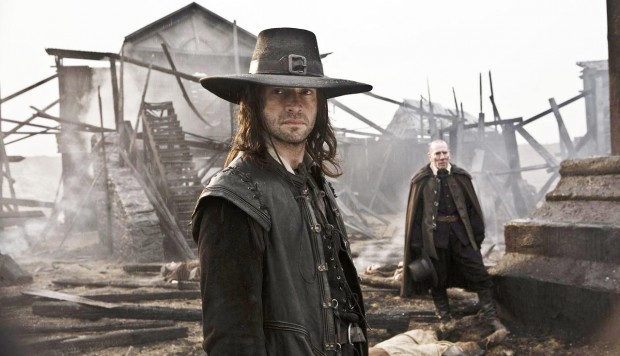
So, my cup runeth over at the moment. I’m actually in Wales at the moment directing some episodes of David Goyer‘s new TV show, Da Vinci’s Demons. So it’s hurt me… well, hurt is too strong of a word. It disappointed me personally that when Kane was getting released around the world, it didn’t naturally then move to the U.S. I grew up on U.S. movies and I like videos, commercials, and cinema, so I’m not a snob about it. I want my film to be seen in America. It was largely done for a North American audience. For Robert Howard fans. It was his home. I wanted it to be seen in its home country. Once it reached its initial wave of release, it just stalled a bit. Everyone was saying to release a film in the U.S. is so incredibly expensive now. It’s $25-$30 million dollars just to market a picture for a wide release. And when you’ve got a movie like Kane, which, now James Purefoy is a fabulous actor, but he’s not a big theatrical star. I’m not a huge box office name as a director.
The character is not hugely well-known. And it’s a genre which is historically very tricky. Lord of the Rings is a standout exception. But fantasy movies don’t do well and then when Conan came out last year and didn’t do very well, it sort of made everybody pause and say, ‘Is there a real audience for Solomon Kane?’ Luckily the Weinteins had always been fans of the movie from way back. They’d always wanted to release it. When they created Radius, which is a new platforming release company, they sure really got it. They understood that the Video On Demand model is a terrific way of releasing these slightly trickier genre pictures. It gets us available on Video On Demand and it gets a small theatrical release just to give it a bit of a goose and make some awareness out there. I’m kind of really happy it’s happened like that. I wish, of course, that it had happened a little bit sooner, but finally for me Kane‘s journey is over and he’s coming home. That’s what I’ve always wanted.
The other bizarre thing for me now is that I’m reading reviews for the movie all over again. People’s responses to the movie. I made my peace with the fact that it’s a movie that polarizes people. I get people saying, ‘It’s the best fantasy movie made.’ ‘It’s the best Howard adaptation made.’ People actually adore it. And then other people completely down it. They hate it. So when your movie’s first released, that first wave of reviews, you get the polarization, and you think, ‘Oh, I’ve done something wrong.’ Now, after a few years, I’m quite sanguine about it. I accept the fact that people have an opinion on the movie. There’s bits of it I’m incredibly proud of and I think are terrific. And there are other bits I watch back and go, ‘Yea, why did I make those choices?’
I’m not going to say what I think it is because in America it’s a fresh release, but couple years down the line we can have a conversation where I’ll say, ‘Yeah, you know what? That bit didn’t work. But that bit really rocked.’ There’s a couple of sequences in the film, and with every movie you make as a filmmaker, you get closer and closer to being able to deliver exactly what you wanted from your movie. ‘I went in intending the scene to be like this, and it’s 100 percent like I intended.’ Or, ‘It’s just 50 percent like I intended because of these reasons.’ With Kane, there are a bunch of scenes which are exactly like I intended, so that’s a great pleasure for me. And the movie is designed to be seen on the big screen and to be heard in a big theater. I hope that people go and see it and enjoy that. But what I really hope is that when they finally watch it on DVD or Blu-ray, they’re watching it on a big television with a great sound system. Because you do benefit from that. It was shot to be an epic theatrical picture.
It’s refreshing to hear a director talk about reviews. Of course, you have distance from when you filmed it to now you’re saying you’re reading reviews again. So often it seems like they’ve become ultra precious over what they’ve made. Is that something you learned growing up or something just ingrained in you naturally?
For me, I’m a fanboy first, right? I enlist in that kind of internet media of Ain’t It Cool News and Coming Attractions. I read all this stuff. Then I have to step outside and say, ‘But I’m also a filmmaker now.’ I made a movie called Deathwatch, which was my first picture. It has Andy Serkis in it and Jamie Bell. It’s a World War I horror movie. It’s really good and still stands the test of time, but every time it’s mentioned in Ain’t It Cool News or JoBlo or somewhere like that, people still pop up and go, ‘Yea, that’s a great movie.’ And someone in the comments will go, ‘Yea, that movie really fucking sucked.’ And the film is 10 years old and people still have an opinion on it. I think that’s also me because I talk about movies like that. The bit of me that’s a fan–and there’s still more fan than a filmmaker [in me], I think–because when I go to Comic-Con, it’s just the biggest thrill of my life. If you’re going to Hall H to present my movie to an audience of six or seven thousand fans, it’s thrilling.
But it’s just much more thrilling to be standing behind Peter Jackson or James Cameron or something. ‘My God, that’s Peter, one of my idols.’ So, when the reviews are coming, you still go, ‘It’s part of the game you’re playing.’ You’re trying to make a movie that everyone’s going to like. To pretend that I don’t read the reviews would be completely disingenuous. I do read them because I get sent them. Like today, I was on set shooting something else and I got sent whole bunch of reviews for Solomon Kane. I was reading them on set. And I’m still laughing to myself because some of them are, ‘Ah, this movie is really bad.’ And some of them are really amazing. How do I deal with that? I don’t know what you’re going to say about it. I’m hoping you liked it enough to be positive about it, but I’ve got no control over that. What’s weird for me is when Silent Hill comes out, around Halloween, they’re going to be fresh reviews. And that’s going to be the first time people are going to respond to it and I’m kind of nervous. What are they going to say? Are they going to like it? Going to hate it? What did I do wrong? Why aren’t they connecting the way I wanted? Are they expecting something totally different from the movie?
Of course, that’s the other thing. I was reading a review and thinking they were never going to like it because they clearly wanted something else. So the reviewers are saying about Solomon Kane that it’s a very serious-minded film. ‘Why isn’t there any comic relief? Why is there no humor?’ Well, because there’s no humor in the world of the character. That’s the movie I wanted to make. You can not like it for that reason, but it’s not a failure on my part. That’s not an author’s choice I’ve made. So I’m in this weird position. It’s like when Prometheus came out this year, right? I was totally a geek. Totally geeked about that movie. Alien is the reason I’m a filmmaker. Ridley Scott is my hero.
I was first in the queue for Prometheus when I went to see the movie and I was hugely disappointed in it. Just totally as a film fan. It’s not the movie I wanted. I’m sure it’s the movie Ridley wanted to make. It’s not what I wanted. I even wrote a review online about it. I took it down really quickly because I thought, ‘Shit, I can’t, as a filmmaker, do that.’ It’s like Dredd, failed last weekend, right? And I’m massively disappointed, because I think it’s a terrific movie. The fanboys didn’t come out for it. I have sort of these two households. As a geek I love this stuff. But as a filmmaker you go, ‘Why didn’t it work? Why didn’t it connect? What was wrong with the marketing? What was the bad choice?’ On a business level. Creatively I think he completely connected. It did exactly the job I wanted it to do. I remember I was at the Comic-Con premiere, sitting right in front of Karl Urban, and just enjoying the hell out of the movie when I saw it.
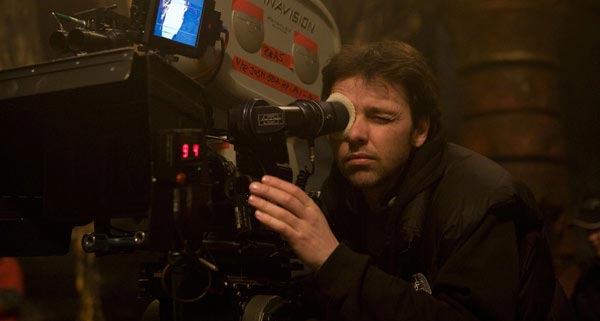
I have to largely agree with you about Dredd. I am trying to champion it and I know quite a few other people in my circle that are trying to champion that film just simply because, hey, maybe they didn’t market it well, but it is out there and I loved it.
What’s bizarre for me is, ‘What more could you have done for that film?’ The film is, for the right audience, a terrific movie. It’s incredibly violent and I suppose you lose half of the people just because of that. But there’s not enough geeks in the world. Because the geeks run the internet, the voice of the geek is very loud. It seems to be loud. But the reality is that people don’t go to the movies saying, ‘Hey, the geeks are saying great things. It’s a hit on the internet.’ They’re still going to the cinema saying, ‘Hey, that’s a cool poster. That’s a cool trailer.’ Just literally, ‘What are we going to see this weekend at the movies?’ Kids go without–what I’m realizing, just hanging out in the UK and I’m sure it’s the same for American teenagers–they go to the movies but they don’t go to see a film. ‘Friday night, what are we going to do? We’re going to do this, this, and this. Let’s go to the movies.’ Stand in the lobby, look at the posters, decide what it’s about and who it stars, and go see it. That’s a really interesting thing that I never even considered. They’re not going to see a particular movie. ‘Hey, what’s one of the ten that seems cool right now?’ If the Dredd poster is not compelling enough, or it’s getting bad word of mouth.
Hell, I stood behind people in a video store who’ve picked up my movies. And I want to lean over and go, ‘I made that!’ But I listen to them. In fact, I’ve had people go and pick it up, look at it, and go, ‘Oh, I heard that was shit’ and put it straight down again. [Laughs] I just want to go, ‘But not, it’s got this and this.’ But as soon as you make a movie and you put it out there, that’s it. It’s gone. You’ve got to let whatever is going to happen. Like with Kane. It took two and a half years to come to America. Is it because it’s a worse movie than all the other movies that are released? Hell no. It’s head and shoulders better than 75 percent of the films. It just didn’t catch at the right time. I’m not the producer of the picture so I don’t know the real ins and outs of it, but you go, ‘Better late than never,’ I think.
Well, I’m glad to see it’s finally being released. I don’t know if lessons can be learned, but hey, it’s out there.
At least people can get it how they want it. And they can stop downloading it from the internet or whatever. [Laughs]
Solomon Kane is currently on VOD and in limited release.

